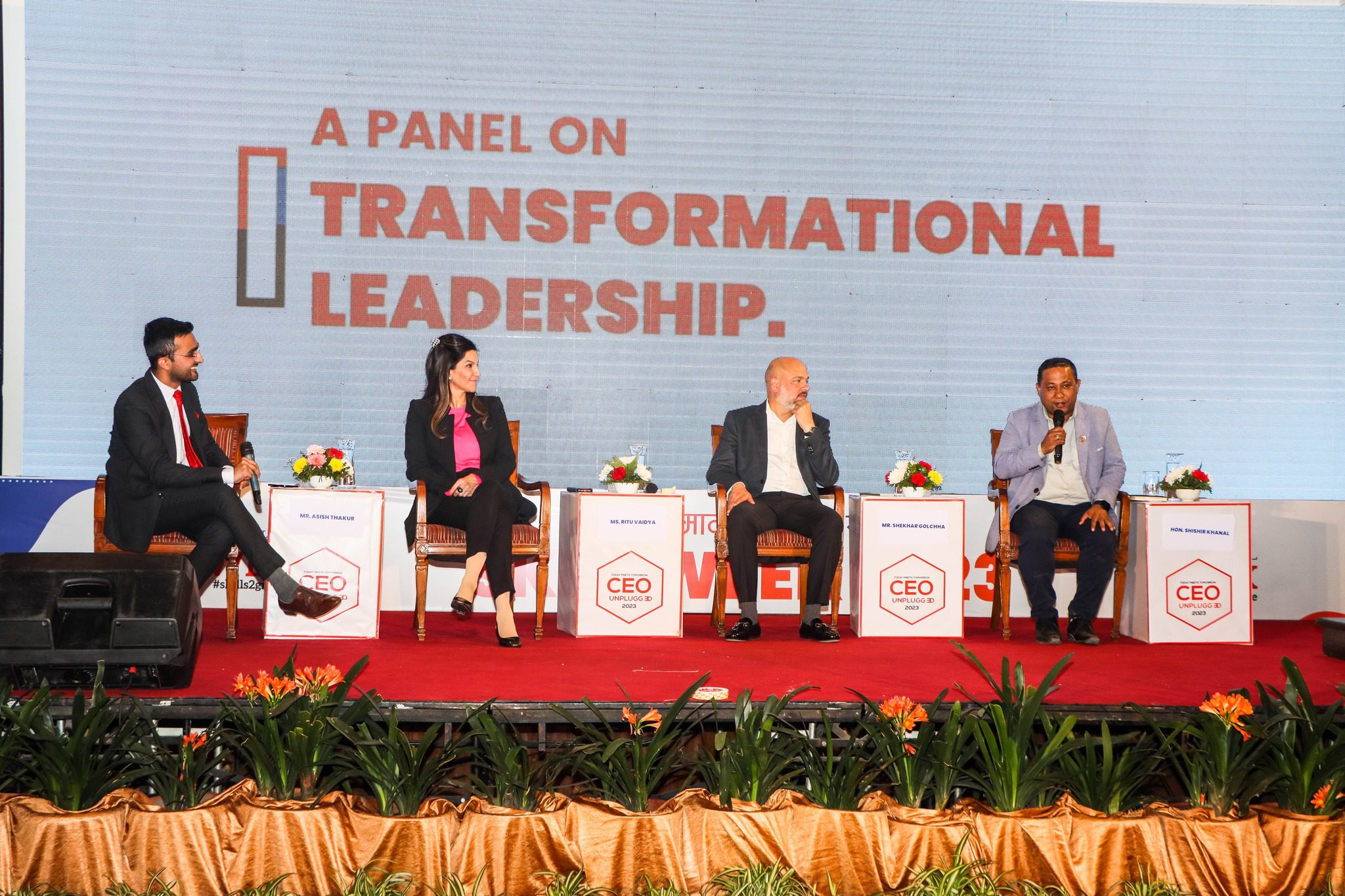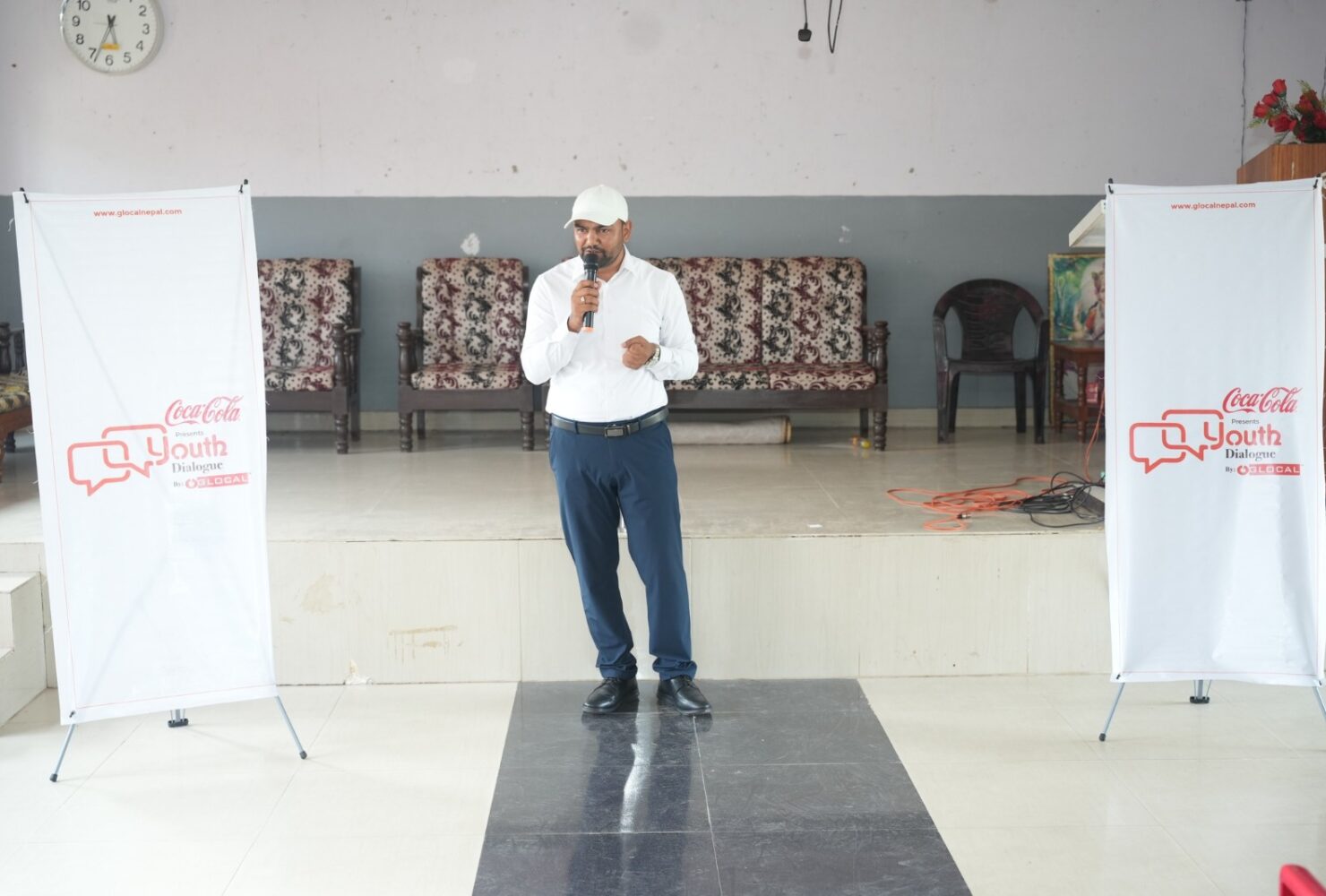CEO Unplugged is a yearly forum organized by Glocal Pvt. Ltd. comprising a series of panel discussions to establish a forum to discuss contemporary business challenges, opportunities, and futuristic views with a sight of experiential learning to the newcomers in the business and students with an objective “Today Meets Tomorrow”.
CEO Unplugged second panel conversed on the topic of ‘Transformational Leadership’. The panel introduced a framework of transformational leadership style that motivates youths to embrace change by cultivating a company culture of accountability, ownership, and workplace autonomy.
The participating panelists were:
- Ms. Ritu Vaidya, Managing Director at United Traders Syndicate Pvt. Ltd.
- Mr. Shishir Khanal, Member, House of Representative, Nepal
- Mr. Shekhar Golchha, President, FNCCI & Chairman, Golchha Group
The session will be moderated by Mr. Asish Thakur, Chairman & Executive Director, Glocal Pvt. Ltd.
Here is the gist of the discussion;
Asking about ‘Transformation’ Ms. Vaidya defines transformation as the change, so she think if you don’t transform or adapt then life is not life. She believes that we should apply Darwin’s theory of evolution to everything on Earth because it ensures survival as long as we keep applying it.
Mr. Golchha believes transformation is the time; except time everything is changeable. Everything changes with time. Until unless we change with the time we feel to exist and its transformation.
Leadership
When asked about leadership, Mr. Golchha shared leadership is all about creating more leaders. He feels leadership is how you exhibit your position and power to create more leaders.
Responding to same question, Ms. Vaidya replied leadership for her is a package of personality, vision, execution and to take the team a long way is leadership.
Mr. Shisir khanal asserts that transformation leadership means leading from behind instead of being frontier, enabling people around you to transform to meet the objective they hold upon.
When asked about how his various life experiences, such as founding a logistics company, winning political seats, and serving as Education Minister for a brief period, have affected his leadership abilities, Mr. Khanal stated that he had worked in many different roles, both in local and government settings. He explained that his focus was on improving the education sector in Nepal, and regarding the logistics company, he recognized that it makes a significant contribution to Nepal’s GDP at 25%, which is comparatively high for both developing and developed countries. He believes that further development of the logistics sector could lead to progress in Nepal.
Furthermore,
When asked about his involvement in various industries and leadership positions in different fields, but not in traditional businesses like cement, Mr. Golchha replied that he finds it challenging to maintain focus and adapt to the culture simultaneously. He explained that in Nepal, it is particularly difficult to achieve vertical growth in business. As a result, his group has ventured into non-traditional industries such as biotech.
When questioned about her transition from the fashion industry to business and how it has impacted her leadership style, Ms. Vaidya replied that she believes in transformational leadership, which emphasizes the ability to bring the team together as you climb higher in the organization. She added that as a leader, it is crucial to remain highly focused on the goals and objectives.
Mentorship
When asked about whether she had a mentor while entering her field, Ms. Vaidya replied that she believes mentorship is crucial for shaping the organization’s character and ensuring its continuity. She added that mentors are essential regardless of whether you are a parent, a founder, or have a different role. She also mentioned that her father was her best mentor, and while there are many people from whom one can learn, she values his guidance and support the most.
Mr. Golchha mentioned several mentors, including Mr. Shishir Khanal, who has made significant contributions in his field. In terms of business, Mr. Golchha mentioned that his father was his mentor, who viewed everything he did in the context of society, not just for business.
According to Mr. Khanal, a mentor is someone who does not judge you, and he has personally observed this quality in Mr. Shekhar, from whom he has learned a lot. He thinks that a mentor’s role is not to ask direct questions to evaluate you but to understand you better. Instead of seeking support from a single individual, he advises seeking guidance from people in different sectors to gain diverse perspectives.
Transformational Leadership
When asked about the role of transformational leadership in changing and innovating government and public institutions, given his position in the HOR of Nepal and his expertise in education, Mr. Khanal responded that he believes leadership is not just about having technical expertise and ensuring that tasks are completed efficiently. He believes that, as a leader, he should strive to establish a human-to-human connection to align objectives. According to him, while it is possible to train people to meet specific objectives, building human connections can lead to more significant connections and benefits.
Upon asked about the potential of transformational leadership to overcome gender and other diversity-related barriers in the workplace, Ms. Vaidya responded that in her experience, micromanagement is not a solution. Instead, a well-defined reporting ladder helps bring out the best in individuals’ leadership skills. However, based on her observation of the workplace culture in Kathmandu, she does not see any evidence of gender bias.
Talking about the changes he is working on as a lawmaker to benefit society, Mr. Khanal stated that one of his personal priorities is working on the education act of Nepal. In addition, his team is developing technology to help create policies that will promote stability in the government.
Key areas to Promote Entrepreneurship
When asked about the key areas that need to be addressed to promote entrepreneurship in Nepal, Mr. Khanal emphasized the importance of education and the economy. He also mentioned that a major issue in Nepal is the lack of access to capital, as banks often require collateral to provide financing. Therefore, he believes that we need to make changes in this area.
Mr. Golcha responded that in order to achieve prosperity in the country, it is necessary to focus on the development of Micro, Small, and Medium Enterprises (MSME). Therefore, his team has been working on addressing various laws related to MSME.
Ms. Vaidya believes that in Nepal, if there is good governance, it will encourage people to take risks and move forward. However, she also thinks that education is even more important than governance in this context.





